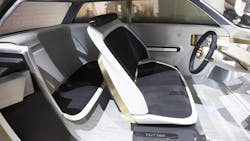What Business Model Should Automakers Pursue in the Digital Age?
It’s no secret that with self-driving cars on the horizon, and ride-sharing/mobility services and vehicle connectivity already well underway, the automotive industry is undergoing significant disruption. Non-traditional participants, including technology companies involved in vehicle connectivity, not only want a piece of the action—they see it as essential to their own growth.
In this rapidly evolving business environment, automakers must determine their role and identify where they can generate the most value from connectivity to remain competitive. If they don’t, they run the risk of being overtaken by digital rivals.
Developing a dominant role in the emerging marketplace will not be easy, given that many consumers are more interested in the experiences generated from in-car connectivity services during the drive rather than the drive itself. Auto companies that historically have been focused on highly organized manufacturing will now have to focus more on leveraging disruptive technology to succeed.
But How, Using What Business Model?
Automakers must consider immediate challenges to formulate the right approach to re-defining their role. For instance, while consumers want their vehicles to be connected and their devices to work seamlessly within their vehicles, research suggests that they will not necessarily be willing to pay extra for that.
To satisfy consumers’ expectations, automakers will have to up the ante, meeting or exceeding what manufacturers of handheld devices offer. Relying on in-house development resources alone is not possible—automakers must collaborate and co-exist with their technology partners. And speed is of essence, with tech companies already operating on faster-paced development-and-product launch cycles.
To carve out a distinct connectivity presence, automakers should focus on their strategic strength of deep vehicle integration by providing vehicle-related functionality bundles in areas such as assistance, remote access, or navigation, and integrate non-vehicle-related services hosted on handheld devices.
Doing so will help automakers avoid losing market share to digital rivals and disruption, while aiding their profitability. Accenture believes that the total business value of connected car services will reach nearly $150 billion by 2020, and more than $650 billion by 2025. On a per-vehicle-basis, a fully-fledged connected car, assuming heavy usage, could deliver over $6,500 in additional value over its lifetime.
The Model
Automakers will need to re-tune their business model to secure dominance within the vehicle and retain access to customer data. This includes being aggressive in providing more in-car digital services and experiences, and fully monetizing the value of connectivity features.
Key elements of the business model include:
- Service Fees. As auto companies further enhance existing service offerings, customer acceptance and usage of these will rise—generating a significant revenue boost. In addition to revenue from fees, automakers also can also use the data they collect on customer connectivity usage, behavior and direct customer contact for their own marketing purposes.
- Third-party Access. Providing business partners with fee-based access to vehicle connectivity user data also is a key value source. For example, insurance companies providing pay-how-you-drive-services will need ongoing access to data generated by vehicles and hosted on automaker telematics platforms to develop policies and pricing based on driver behavior. Automakers may need permission from customers to use or sell this data, however.
- Data Monetization. Additionally, automakers could sell aggregated data on mobility and driving patterns. For instance, retailers might need traffic flow insights to determine suitable locations for new stores. Such data could also aid the automakers’ product development and contribute to their marketing research capabilities.
- Cross-Selling. Automakers can increase after-sales revenue by leveraging a customer’s vehicle data connection to anticipate upcoming maintenance needs, and transmit the information to their preferred repair service shop to schedule a service appointment. However, auto companies will need to find the proper incentive to encourage customers to allow such use of their data.
- Up-Selling. To further boost revenues, automakers can sell vehicle options that rely on connectivity, but are stand-alone features. One example is connected autopilot functionality. Such features can be sold separately from a connectivity bundle to avoid implying that they are another free feature that is part of the head unit. Positioning and pricing them independently will maximize their value.
- Hardware. The head unit, as the most prominent hardware piece in the car, is vital to vehicle connectivity and currently commands a premium price. As ever-smarter handhelds outpace head unit functionality, price premiums will decline. Instead of justifying head unit price increases by adding more features, automakers should progressively lower the price point, making it easier for customers to access additional connectivity features. This will generate more sources of value.
- Over-the-Air Upgrades – To date, auto companies have been reluctant to fully use connectivity to upgrade vehicles after they have left the factory. But this reluctance will likely diminish in the future, as the opportunities presented by such functionality will lead to wider acceptance across the industry.
It is critical that automotive manufacturers adjust their business model to not only fully leverage vehicle connectivity data, but to own it to solidify their role in the market as a hedge against digital disruption. By adopting this strategy, they will be in a much better position to prevail and excel in a market moving inexorably toward digital change.
